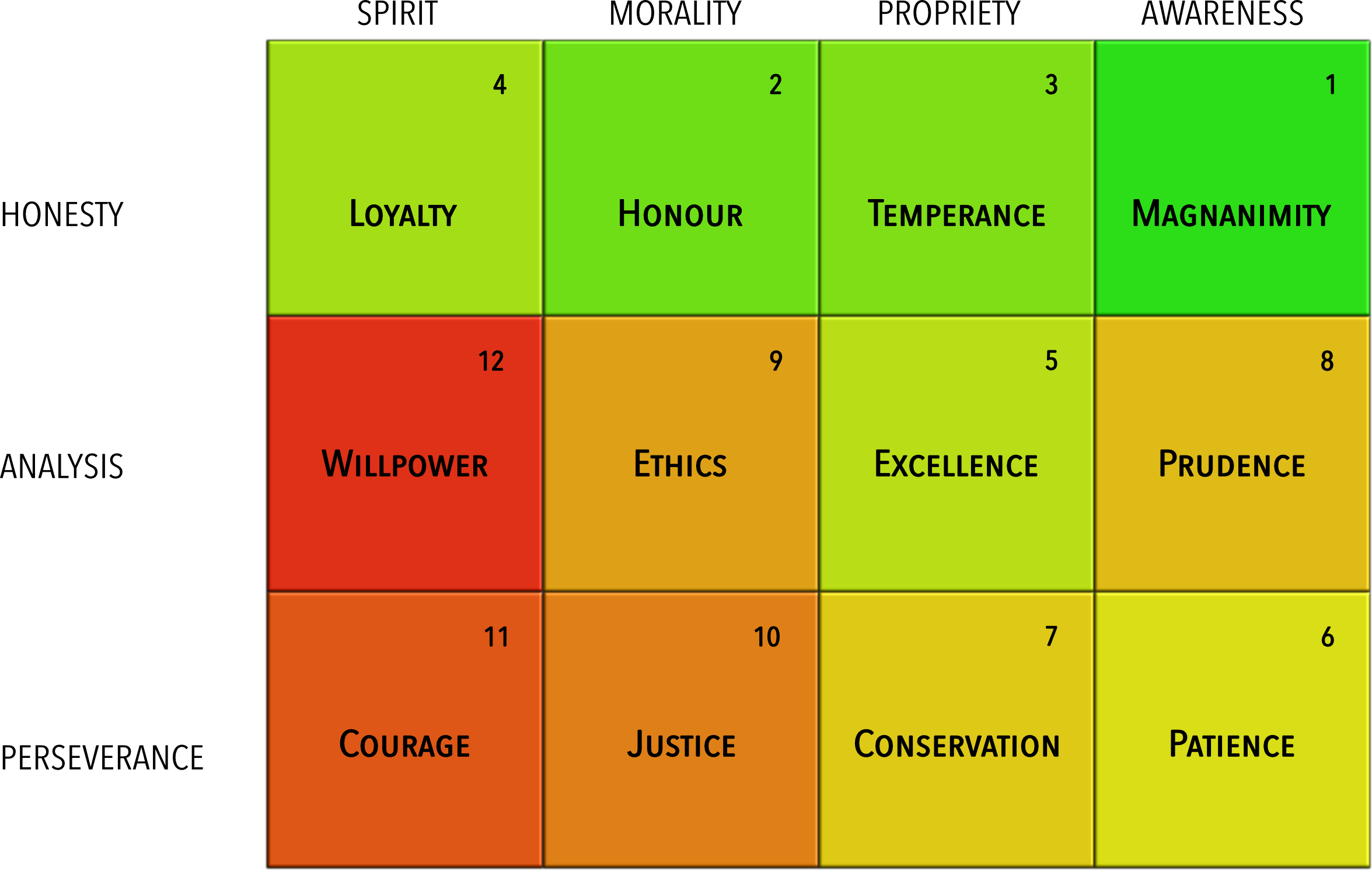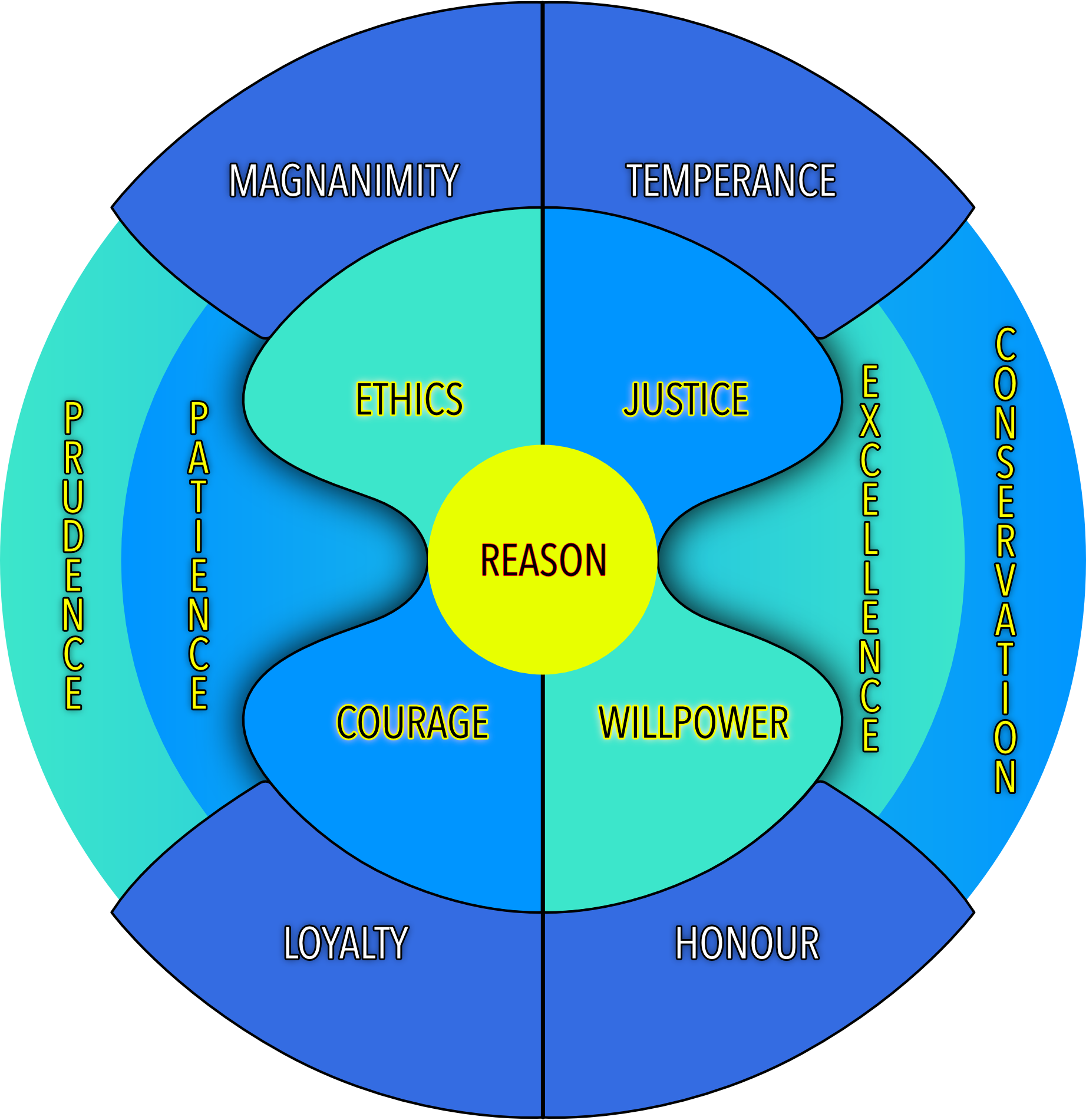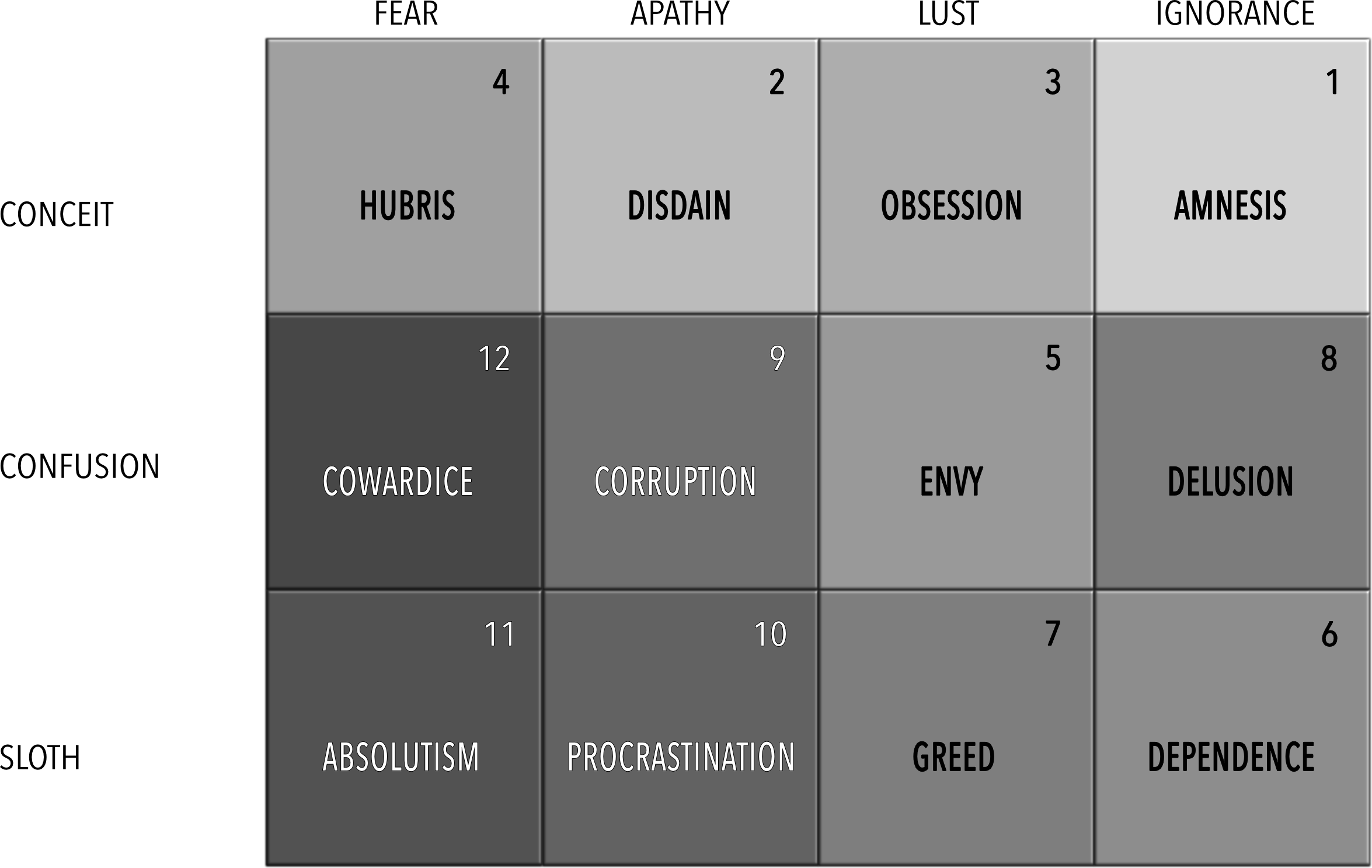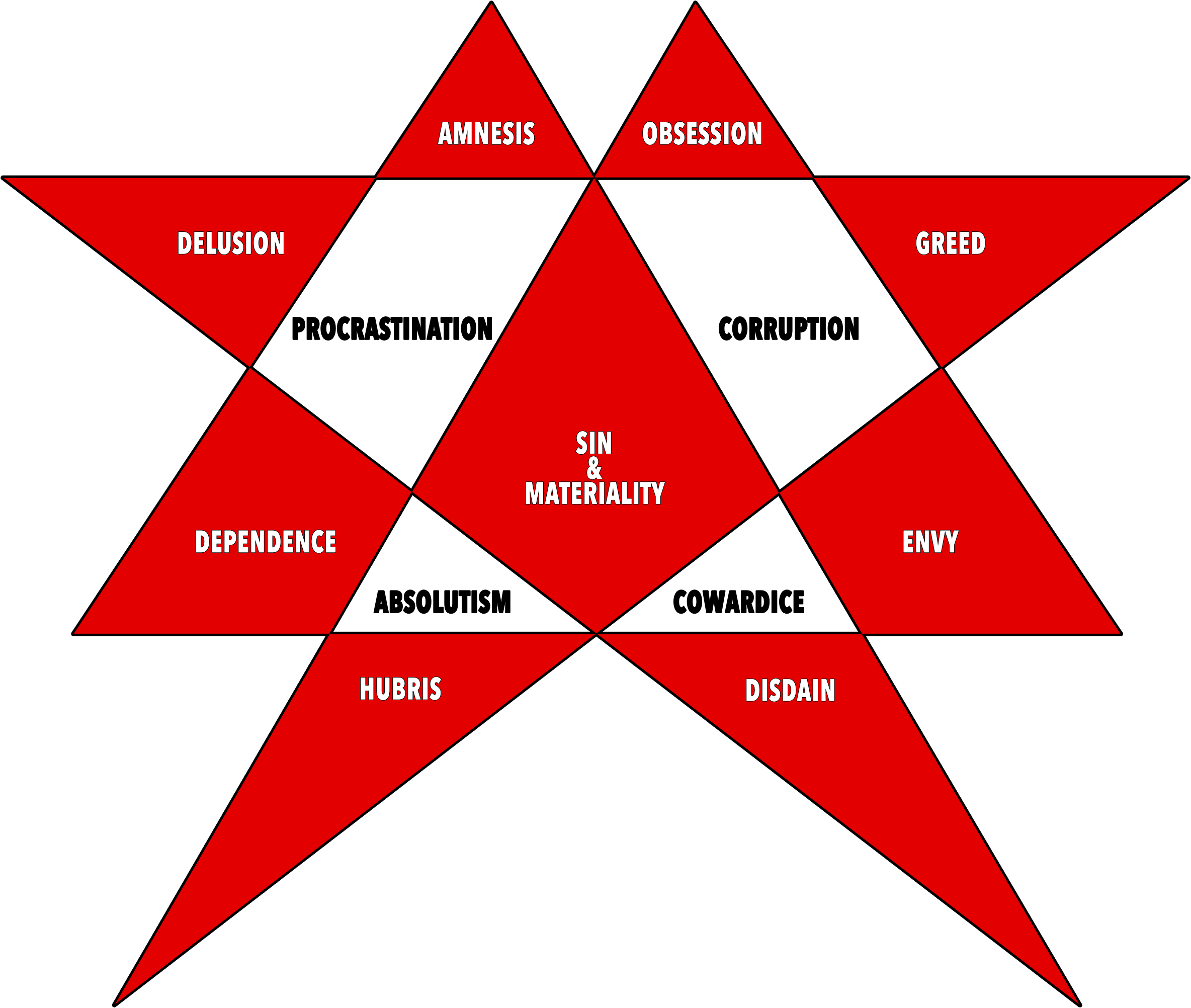structuralvirtuestheory
STRUCTURAL VIRTUES THEORY
The Dozen Skills in Reason – Resurrexit Spiritus part 5
Dr. Marcus Aurelius Roe (2023)
“That which exercises Reason is more excellent than that which does not exercise Reason. Since there is nothing more excellent than the Universe, nothing exercises more Reason.”
-Zeno of Citium
“The wise man who knows himself and has in constant comradeship his own Spirit to fight at his righthand, will neither cringe at what the vulgar fear, nor dare to do what most men do without the slightest shame.”
-Apollonius of Tyana
“The anxieties of these times, deceitfulness of riches, and appearance of other desires choke Logos, and it becomes unfruitful.”
-Jesus Christ

Figure 1 – Virtue Chart – The three aspects of Reason are labelled on the left with the four moments labelled above. The ‘Diligent Dozen.’
| aspects-V / moments-> | Awareness | Propriety | Morality | Spirit |
|---|---|---|---|---|
| Honesty aspect | 1 Magnanimity | 3 Temperance | 2 Honour | 4 Loyalty |
| Analysis aspect | 8 Prudence | 5 Excellence | 9 Ethics | 12 Willpower |
| Perseverance aspect | 6 Patience | 7 Conservation | 10 Justice | 11 Courage |
The twelve virtues are the products of three aspects of Reason through four moments. Each virtue is a skill in itself. The three aspects in Honesty, Analysis, and Perseverance are the necessary components of Reason. These aspects of Reason must be activated through the moments of Awareness (reflect), Propriety (response), Morality (right), and Spirit (culture). These twelve virtues together comprise the thirteenth overall skill, Reason itself.
Skill-building is the increase of familiarity with a category of action through repetition, including aligned physical and mental exercises. These are chosen, generally, given the preferences of the developed personality, and then further refined through experience. However, it all gets pulled in and forward, though not fundamentally changed, with the interpositions of virtues.
STRUCTURE OF VIRTUES

Figure 2 – Sphere of Reason – The virtues are acquired in order, generally inward from the outside. Primarily, this demonstrates the relationships between the virtues.
I followed the model of the Universe to construct an immanent replica in placing Reason, as retaining highest potentiality of all thought energies, at the centre of mental systems. As above, so too internally. Magnanimity is the primary entrance to the virtues. This remembrance of identification, or self-valuation, allows the institution of Honour, valuation generally. The Temperance virtue restricts distasteful things contradictory to those Honourable values. In the demonstration of Honour comes Loyalty towards the same seen in others.
Application of this Loyalty in true Honesty results in the recognition of Excellence. Patience derives from the revaluation in Excellence and an appreciation for the time that this takes. Conservation, the most paternal virtue, is based in the desire to retain that which is Excellent through the perspective of Patience. Prudence is the most maternal virtue and, alongside its siblings in Excellence, Patience, and Conservation, foundational to the continuance of all virtues. Figure 2 demonstrates how they underlie the rest while generating first attachments to Reason. The caution in Prudence generates the demand for Ethical realignments of values and desire for Justice in the wider World. This righteous protectiveness of values grants Courage. The final virtue replicates the first, Magnanimity. This is Willpower, the realisation of the self in full complement of community and virtues.
A numerological mnemonics system has been carefully threaded throughout this theory, for ease of processing and understanding. This is logically constructed out of basic relationships between the virtues coordinated with a comprehension of philosophical relationships within numerical topography. The concepts behind Elevational Motive of Resurrexit Theory served as an essential backdrop throughout its construction. All of reality is coordinated and so proving relationships that are at least allegorical should be a simple task throughout.
PRE-LOGOS DOMAIN – VIRTUES ONE THROUGH FIVE IN DETAIL
One is the ruling principle, Reason that exists because of memory and recollections. All numbers are through Reason, self-multiples of One. Its presence is recognisable through the first perfective virtue, Magnanimity. Magnanimity is the natural result of identity remembrance through the moment of Awareness and the Honesty aspect of Reason.
This Awareness in relation to Honesty comes from extended time in moderation of the Eros domain. This extended moderation in Eros domain naturally evolves into a recognition of the new dialectical form in Logos domain, mastery and power. This introduces potential conditions by which the virtues can increase and expand, since the remembrance of true self is required to begin the Logos work.
The Reason for entering the Logos at the cost of Eros is never to ignore the World. Rather, the Reason is to set the person into order for greater contributions to family and community. Ultimately, personal actions either help decide the fate of the World or they do not. The moment of true power and mastery is when a person stops considering the present World as an end of history, but rather the beginning of a history yet to be forged.
Magnanimity is, essentially, the appropriate ordering of forgetfulness, to forget all the things the person is not. This order naturally develops as the other virtues blossom. It prepares the self for Logos domain. The differentiation between desired future self and undesired non-self in Magnanimity is the initiating behaviour of the conscious dialectic, which can be called proto-spirituality. This is similar to how Kratos, the first domain, is proto-socialisation. Magnanimity replicates Kratos domain in this way.
Two is the negating and contrasting principle implied by One. It is the Reason for Reason. Two manifests the primary divide that exists between Spiritual and Material, and is reminiscent of One, in the original separation from zero, nothingness or potentiality. The first divide is replicated in every domain, imperfectly and ignorantly until Logos. The second perfective virtue is Honour and is made possible through Love. The functions of Qualification and Noble Negation, or Honour, are based in willingness to maintain Moral alignments in the face of resistance and through the Reason aspect called Honesty, which is essential to acquiring the other virtues. Honour can also be described as devotion to an advantageous moral ordering. If Magnanimity is avoidance of unimportant and harmful things, then Honour is loving that which is best for the self and hating those things most antithetical to the self. These effective arrangements are determined by culture, moral education, and experience.
As witnesses to the contrast in the World’s obsessions with frivolities, those exercising Magnanimity and Honour develop Temperance. The addition of the third pillar provides the balance in personality upon which others can rely. Three represents the defining principle, measuring the contrast and negation represented in two. Thus, three fulfils the promise of One, in defining and locating it. The third virtue is Temperance that evolves out of comfort in identity, or the ordering of pride. This evokes measured responses to change and appears first as humility, until onset of the later virtues. Temperance measures the World and the self through the moment of Propriety in Honesty, increasing order through pride in order.
The fourth apparent virtue is Loyalty, naturally evolving out of ordered pride and the authority of budding mastery in the Honesty aspect across the four moments. Four represents harmony, or negation of contrast, and involves a reordering of perspective, or comprehension of greatness. Confirmation of the identity, as first remembered in Magnanimity, is the natural course of Loyalty. This is a devotion to the bond with others closest in alignment with the personal Honour. Loyalty is the most mature virtue in the four moments of Reason’s Honesty aspect, as it is the first to answer the moment of Spirit, the meaning of Logos.
Of course, this increases harmony in all actions only possible through true Honesty. Harmony opens the first peek into the Analysis aspect of Reason. This starts with the Excellence virtue in the moment of Propriety, nearest Temperance. Excellence is indeed an exceedingly harmonious phenomenon. People who have fabricated falsehoods most of their lives will find it impossible to attain to the moment of Excellence identification, which fails upon the false Honesty. Living in unwelcoming environments forces lies. This blocks most spiritual advancement. This is because the Analysis aspect of a chronic liar is permanently damaged before achieving harmony.
Five presents alignment or perfective material exclusivity. This means the inclusion of higher Reason into the harmony of reality. This ordering of the nature into alignment with the attained Honesty, also entails negation of definitions for the purpose of reintegration. Old definitions must be negated to forge new comprehensions through Honest Analysis in Propriety.
SIN DIVERSION

Figure 3 – Sin Chart – The three aspects of Materiality are labelled on the left with the four moments labelled above. The ‘Dirty Dozen.’
| aspects-V / moments-> | Ignorance | Lust | Apathy | Fear |
|---|---|---|---|---|
| Conceit aspect | 1 Amnesis | 3 Obsession | 2 Disdain | 4 Hubris |
| Analysis aspect | 8 Delusion | 5 Envy | 9 Corruption | 12 Cowardice |
| Perseverance aspect | 6 Dependence | 7 Greed | 10 Procrastination | 11 Absolutism |

Figure 4 – Star of Demoralisation – This represents the sins and the relationships between them. The centre sins are the most immanent and least visible. The rays are the visible sins.
If a liar is able to accomplish the four moments of Honesty, which is impossible without strong group support, it will be false and fail at Analysis, proceeding no further. In fact, liars fool themselves through Amnesis, Disdain, Obsession, and Hubris, the four basic moments of the Conceit aspect of Materiality. These are the results of the diminishment of Magnanimity, Honour, Temperance, and Loyalty, respectively.
Instead of the harmony of Honesty revealing the first glimpse of Analysis, Excellence, the liar finds deepening Envy. This is usually quickly followed by the other errors in the Conceit, Confusion, and Sloth aspects of Materiality at the moments of Ignorance, Lust, Apathy, and Fear. In order, these are Dependence, Greed, Delusion, Corruption, Absolutism, and Cowardice, as demonstrated in Figure 3 and Figure 4.
This Sin Chart is recognisable as a reflection of the Virtue Chart in Figure 1, with each sin being overcome systematically through manifestation of the preceding virtue, acting as the tool for unlocking the next virtue. Each of the sins must be overcome or managed. Sinners forget who they are, hate what is Good, obsess over insignificant things, and cower from revelation. Some liars will recall who they are in perverted honesty, and then show a degenerative loyalty for things and people aligned to their own base urges. This is called ‘viral perversion,’ where such behaviour is encouraged by organisations who then receive that perverse loyalty.
LOGOS DOMAIN – VIRTUES SIX THROUGH TWELVE IN DETAIL
The Propriety of Excellence judgement forces Awareness in Perseverance, or the sixth apparent virtue of Patience which is practically a replication of Magnanimity in its absolute ordering of interests. It is the remembrance of other identification and who they must be, implying an immediate forgiveness above and beyond mere Magnanimity. Six is ultimate definition or division, identical with sex. Six is negation through redefinition of the defining factor, or lying. This means six also represents deception, being half of the full twelve or one half of the face, as on a clock. Similarly, Patience is an acceptance of delays due to differences, based in the realisation of how little is controllable.
The seventh virtue appears as Conservation. Conservation is the fulfilment of the promises inherent of Temperance and Excellence, based on Patience. Perseverance aspect of Reason is basic to virtues to do with timing, including Patience and Conservation. The onset of the Conservation virtue marks the completion of the moment in Propriety. The first wholeness occurs here. The completion of the four moments of the Honesty aspect and the three aspects of the Propriety moment encourages the maximisation of Logos domain residence. Seven is easily recognisable as the very quintessence of Life, and is essential to the Logos domain. It is the addition of Reason, the One, to the duplicity of differing definitions. The application of Reason turns division toward the greatest Good possible. Seven is the definition of harmony, contrast of alignments, and Reason for division. This Logos domain redresses and improves all aspects, which is to say Reasoned activities of perfection, in its constant duplication of the lower domains.
The earlier nascent level of Analysis, with just Excellence, included only one moment of Awareness and could not proceed without the greater identifications of others and universals. This is because Prudence, the Awareness moment of the Analysis aspect, can only be acquired after the other virtues in the moment, Magnanimity and Patience. Prudence requires appreciation of worthiness, through completion of the three virtues in the Propriety moment, Temperance, Excellence, and Conservation. Eight is grand harmony, definition of alignment, contrast of division, and Reason of Life or Logos. It is harmonisation through negation. Above all, eight is Spirit.
Nine represents Death, the produced conclusion of material perfection or perversion activities. It is harmony of alignment, definition of divisions, contrast of Logos, negation of Life, and Reason for Spirit. In many philosophical systems, Death represents the cessation of internalised materialism. The ninth virtue is Ethics, occurring through the Analysis aspect in the moment of Morality. The Ethics are inward products of completion in Propriety and Awareness moments, alongside Loyalty and Honour. This comes from a desire for stability and the fair application of rules, stemming from Prudence.
Ten is Progress or grand realignment. It is harmony of division, definition of Logos, and contrast of Spirit. It is the Reason for Death. The tenth virtue, Justice, is a desire for the presence of morality in society. This is the projection of Ethics into the realm of universals, or contest of particular interests. It is a reconfirmation of the material exclusivity of five through the redoubling of Excellence in negating action.
Eleven is Universal Order. It is the Reason of Progress, alignment of division, harmony of Logos, definition of Spirit, and contrast of Death. The eleventh virtue is Courage which is won directly from actions toward Justice. The Courage of the virtuous overcomes any hatred of virtue, or “evil,” simply by existing and serving Good through the Universal Order. The knowledge of this alone is extremely powerful. It is this Courageous empowerment, after the completion of the three Morality moments of Reason, that drives Willpower.
Twelve is Truth. It promises grand redemption and division of deceptions. This is the alignment of Logos and harmony of Spirit through the definition of Death. It is the contrast of Progress, and Reason for Universal Order. The grace of all aspects and moments of Reason provokes optimisation of the Logos domain, as realised through wisdom. Willpower is the twelfth virtue, Life driven by Love through completion in Reason.
Truth is a simple ideal and infinite in domain, whereas wisdom is finite but limitless in expression. Truth, the ideal, is ignorant of the infinity of falsehoods and relies upon none for its definition. However, the mind will also be imprinted by falsehoods in the immanent erosic dialogue.
SUMMARY – OF WISDOM AND WILLPOWER
Wisdom is the reasoned stratification of knowledge and experience for the optimal retrieval of Truth. Wisdom is inclusive of less than the total Truth but with greater diversity, giving a sampling more representative of particular reality. Wisdom presents an open exchange between Truth and falsehoods. As an embodiment of reflections, wisdom encompasses falsehoods and organises them.
This reorganisation of falsehoods that shadows the immanently constructed Truth enables objectivity. The mind is free to imagine anything, and reject that which is unworthy for being pertinent to neither particularity nor universality. The triumph of Willpower, after first conquering the self, sets the mind free. This is the completion of the Sphere of Reason and the final grace of virtues. A person with a free mind focuses efforts toward meaningful contributions to society. Where Justice is a redoubling of the negating action in Excellence, Willpower is a mission to project Justice through Reason, or moderation, in the power and mastery states of Logos domain. Justice, Courage, and Willpower together comprise a rebirth in Reason through Progress, Universal Order, and Truth. The unjust believe they use others, however friction in the longstanding engine of Good is only ever meant to be overcome.